
-
Featured products
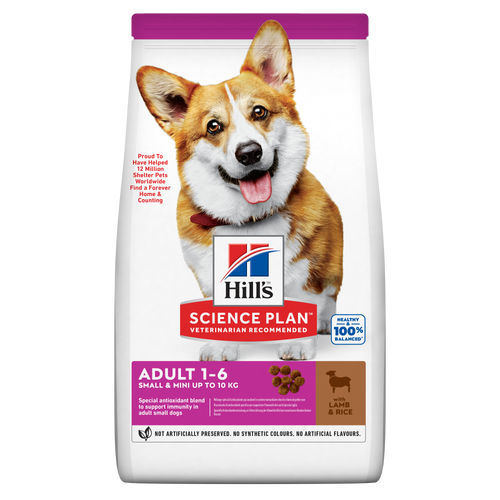 Small & Mini Adult Dog Food
Small & Mini Adult Dog FoodHill's Science Plan Small & Mini Breed Adult Dog Food with Lamb & Rice is a complete pet food, specially formulated with ActivBiome+ Multi-Benefit Technology.
Tailored nutrition for the unique needs of small dogs during the prime of their life.Shop Now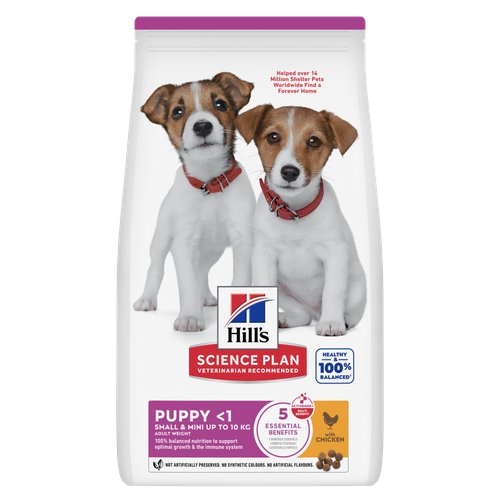 Small & Mini Puppy Food
Small & Mini Puppy FoodHill's Science Plan Puppy Small & Mini Breed Dog Food with Chicken is a complete pet food, specially formulated with ActivBiome+ Multi-Benefit Technology.
100% balanced nutrition to support optimal growth & the immune system.Shop Now Small & Mini Mature Adult Dog Food
Small & Mini Mature Adult Dog FoodHill's Science Plan Small & Mini Breed Mature Adult Dog Food with Chicken is a complete pet food, specially formulated with ActivBiome+ Multi-Benefit Technology.
Tailored nutrition to support graceful ageing in small dogs. Specially made with a synergistic blend of nutrients for energy & vigor.Shop NowFeatured products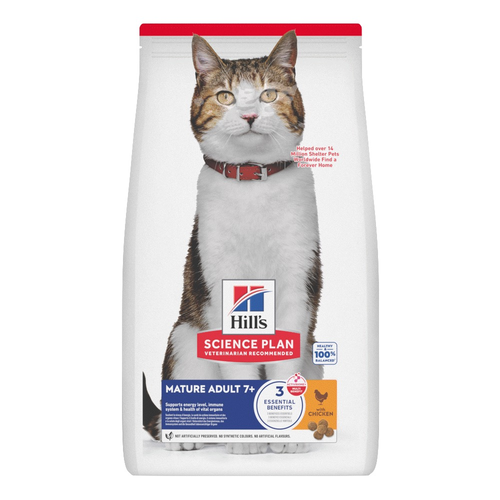 Mature Adult Cat Food
Mature Adult Cat FoodHill's Science Plan Mature Adult Cat Food with Chicken is a complete pet food, specially formulated with ActivBiome+ Multi-Benefit Technology.
This food supports graceful aging in cats, providing a synergistic ingredient blend to help support energy & activity levels.Shop Now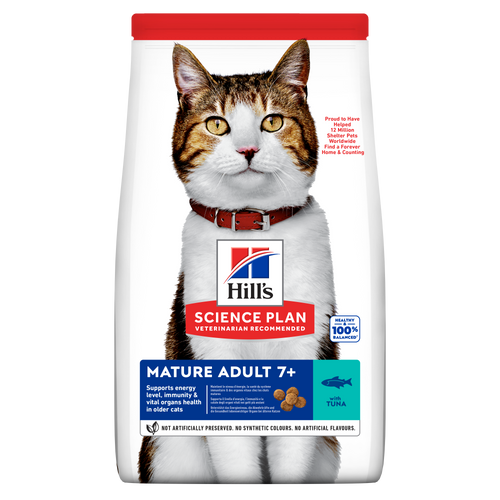 Mature Adult 7+ Cat Food
Mature Adult 7+ Cat FoodHill's Science Plan Mature Adult Cat Food with Salmon is a complete pet food, specially formulated with ActivBiome+ Multi-Benefit Technology.
This food supports graceful aging in cats, providing a synergistic ingredient blend to help support energy & activity levels.Shop Now Oral Care Adult Cat Food
Oral Care Adult Cat FoodHill's Science Plan Oral Care Adult Cat Food with Chicken contains clinically proven kibble technology to reduce plaque & tartar build up.
Shop Now -
Dog
- Dog Tips & Articles
-
Health Category
- Weight
- Food & Environmental Sensitivities
- Urinary
- Digestive
- Joint
- Kidney
Featured articles The Incredible Science Behind Your Pet's Microbiome
The Incredible Science Behind Your Pet's MicrobiomeLearn what your pet's microbiome is, how it contributes to your pet's gut and overall health, and why nutrition is important in maintaining healthy microbiomes.
Read More Proteins
ProteinsTo make a protein, amino acids are linked together in a long chain. The chain is then bundled into to a three-dimensional structure, like a tangled ball of yarn.
Read More The Right Diet For Your Pet
The Right Diet For Your PetIn people, the right diet is very important. If you are eating the wrong way for your metabolism, activity level, age and lifestyle you could end up with health issues.
Read More -


Puppies are beyond adorable, but let's face it — raising a puppy is full of challenges. If you've never had a puppy before, the task can seem daunting, but once those big puppy eyes capture your heart, there's no turning back. Here are some helpful tips to navigate the puppy development stage and ensure your new four-legged friend grows into a happy, healthy, and well- adjusted dog.
Why Raising a Puppy Takes Patience and Care
Puppies are energetic and intensely curious about their surroundings. Life with a puppy is not that different from life with a toddler — you'll need patience to keep them out of trouble, teach them appropriate behavior, and safely introduce them to the world.
The good news? Puppies sleep a lot, although they don't always sleep through the night. Expect whining or barking if they wake up needing the toilet or feeling scared. Puppies also chew — a lot — as their adult teeth come in. That living room rug, couch, favorite pair of shoes, or even your hand may become a teething ring! Remember, this phase is temporary, and most puppy tendencies fade as they grow.

Preparing for Puppy Parenthood
If you're bringing home a puppy, preparation is key. Take time off work or arrange to work from home to tend to their needs. Frequent bathroom breaks, supervision, and bonding time are essential in those early days. This sets the foundation for a well-adjusted, house-trained pup.
Puppy-Proofing Your Home
You can't supervise your puppy 24/7, so puppy-proofing is a must. Secure electrical cords, move toxic plants and cleaning supplies out of reach, and close off any openings where a curious pup could get stuck or lost. Crawling through your home for a puppy’s-eye view helps identify hidden hazards.
Have a crate or a confined space ready for house training.
Provide training pads for accidents.
Include a comfy dog bed, water dish, and toys.
Create a safe space where your puppy can retreat when overwhelmed.
Essential Puppy Supplies
Stock up on these puppy essentials to keep your new furry friend happy and healthy:
Food and water dishes (avoid kitchen bowls — puppies are rambunctious!).
High-quality puppy food and healthy treats.
Collar with ID and a lead/harness.
Crate or dog carrier.
Dog bed and blanket.
Puppy-safe toys and chew items.
Puppy shampoo, nail trimmers, and a dog brush.
Biodegradable poop bags.
Pet-safe cleaner for inevitable accidents.
Puppy Nutrition: Feeding for Growth and Health
Puppies have different nutritional needs than adult dogs. Choose a high-quality puppy food formulated for their growth. Consult your veterinarian about portion sizes and feeding schedules, especially for large or small breeds, as their growth rates and energy needs vary.
A structured feeding schedule helps prevent complications like stomach bloat in large breeds.
For example:
Six to twelve weeks old – four meals per day.
Three to six months old – three meals per day.
Six months and older – two meals per day.


Tasty Tips
Training and Socialization: Building a Well-Behaved Dog
Start house training as soon as your puppy arrives. Keep them confined to a small area or crate during toilet training, and establish a routine. Puppies typically need to relieve themselves every couple of hours.

Reward successful bathroom trips with praise and a treat.
Use positive reinforcement to build happy associations with correct behavior.
Avoid giving shoes, socks, or off-limits objects as chew toys.
Never yell at or hit your puppy; redirect negative behavior back to something positive.
Sign up for puppy classes for socialization and training — these are invaluable.
Proper socialization helps puppies grow into well-adjusted dogs. Introduce them to new people, places, sights, and sounds. Ensure any doggy playmates are vaccinated and healthy to keep your pup safe.
Your Puppy's Health: Vet Visits and Wellness
Schedule a wellness visit with your vet soon after bringing your puppy home. Your vet will check for health problems, recommend a parasite control program, and create a vaccination schedule. They’ll also advise on spaying or neutering to reduce health and behavioral issues.
Until your puppy receives all their vaccinations, avoid dog parks or places with unknown dogs. Your vet can also answer questions about feeding, tooth brushing, nail trimming, and grooming.
Book a six-month vet visit to monitor growth and prepare for adolescence.
Discuss behavioral changes and tips for transitioning to adulthood.
Puppy Playtime: Exercise and Bonding
Puppies need exercise, but it doesn’t always mean long walks. Playtime is often enough to burn energy and strengthen your bond. Games like fetch, tug-of-war, and hide-and-seek work wonders. Aim for 30–60 minutes of playtime daily, alongside walks or backyard romps.
Grooming: Establishing a Routine
Start grooming early to make it easier for both of you. This includes:
Brushing their coat (especially important for shedding or mat-prone breeds).
Trimming their nails regularly.
Bathing with puppy-safe shampoo (prepare for a wet adventure!).
Brushing their teeth to protect their oral health.
Raising a puppy takes effort, patience, and love, but the rewards are immense. With time and positive reinforcement, your rambunctious pup will grow into a well-behaved, fun-loving companion who makes all your hard work worthwhile.


Jean Marie Bauhaus is a pet parent, pet blogger, and novelist from Tulsa, Oklahoma, where she usually writes under the supervision of a lapful of fur babies.
Related products

Hill's Science Plan Small & Mini Breed Adult Dog Food with Lamb & Rice is a complete pet food, specially formulated with ActivBiome+ Multi-Benefit Technology.
Tailored nutrition for the unique needs of small dogs during the prime of their life.

Hill's Science Plan Small & Mini Breed Mature Adult Dog Food with Chicken is a complete pet food, specially formulated with ActivBiome+ Multi-Benefit Technology.
Tailored nutrition to support graceful ageing in small dogs. Specially made with a synergistic blend of nutrients for energy & vigor.

Hill's Science Plan Puppy Small & Mini Breed Dog Food with Chicken is a complete pet food, specially formulated with ActivBiome+ Multi-Benefit Technology.
100% balanced nutrition to support optimal growth & the immune system.
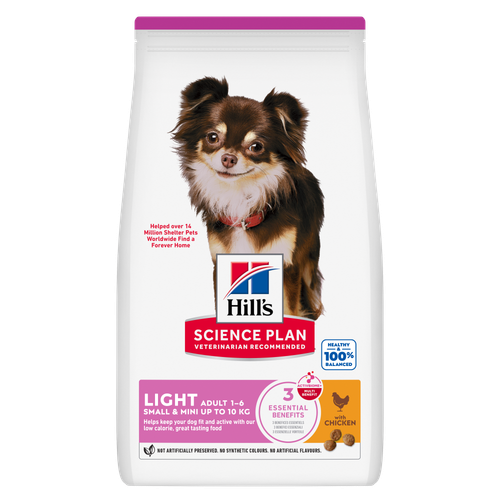
Hill's Science Plan Light Adult Small & Mini Breed Dog Food with Chicken is a complete pet food, specially formulated with ActivBiome+ Multi-Benefit Technology.
Helps keep your dog fit and active with our low calorie, great-tasting food.
Precise nutrition for less active adult small dogs that require a low calorie food to help maintain a healthy weight & lifestyle.
Related articles

Learn more about the problem of dog obesity and more importantly, what you can do to help your dog avoid becoming overweight.

Learn about the symptoms, causes and treatments of dry puppy skin and how to provide relief for your dog. For expert skin care advice, visit Hill's Pet MT.

Learn the the dangers of feeding your dog chocolate, which types are most dangerous, and what to do if you discover that they have consumed chocolate.

Learn what you can feed your pregnant or nursing dog to keep her and her new pups healthy.

Put your dog on a diet without them knowing
Our low calorie formula helps you control your dog's weight. It's packed with high-quality protein for building lean muscles, and made with purposeful ingredients for a flavorful, nutritious meal. Clinically proven antioxidants, Vitamin C+E, help promote a healthy immune system.
Put your dog on a diet without them knowing
Our low calorie formula helps you control your dog's weight. It's packed with high-quality protein for building lean muscles, and made with purposeful ingredients for a flavorful, nutritious meal. Clinically proven antioxidants, Vitamin C+E, help promote a healthy immune system.

